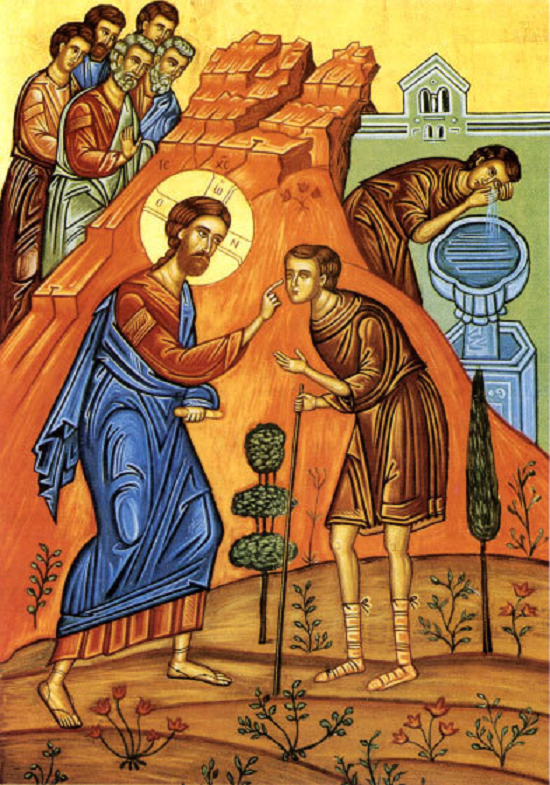Light from Darkness; Darkness from Light
Fourth Sunday of Lent Scripture Readings

As my starting point today, I’d like to take the phrase that Jesus speaks toward the end of the gospel passage. He says, “I came into the world for judgment, so that those who do not see might see, and those who do see might become blind.” What can we say about the “judgment” Jesus refers to? It’s not from a judgment from a robed figure passing a sentence of condemnation on a defendant. In this gospel story, there is neither a defendant nor a judge…not even God. Although the Pharisees take it upon themselves to judge both Jesus and the man born blind—and execute a kind of sentence on him—that’s not what Jesus means. In this story, Jesus is more of a catalyst than a judge. We can better understand what Jesus meant by considering the gospel story in greater detail.
The protagonist in the story is a nameless man born blind. The thrust of the story hinges on that fact: he was born blind. In other words, of all of Jesus’s miracles, this one is not a healing. Jesus did not return the man to a previously healthy state. Rather, this is a miracle of liberation. Jesus frees the man from a condition that he’d had since birth. The question that the disciples raised at the outset, “Who sinned, this man or his parents?” reflects a belief common at the time which unfortunately persists today. They were assigning moral blame for a physical evil. They blamed the victim. But God doesn’t send natural disasters to punish moral failures. God isn’t that kind of judge. Instead, God acts as a kind of mirror letting us see the truth, with all its beauty and all its flaws. Notice what Jesus does. First, he refuses to assign blame—neither one has sinned—then he tells his disciples the moral he will teach—the difference between light and darkness—finally, he fixes the problem.
In this gospel story, Saint John shows us the ascent of the man born blind from darkness into light, at the same time he describes the descent of the Pharisees from the light into darkness. The man born blind rises from physical blindness into daylight, then into intellectual light, and finally into spiritual light. The early Church fathers saw the anointing of the man’s eyes with spittle as a symbol of the healing water of baptism and the anointing of the newly baptized with oil. The progressive enlightenment of the man was symbolic of the growth of faith in the neophyte, blossoming into the mature faith of the adult Christian. Once again, the mystical Gospel of John breaks open an earthy story to reveal its spiritual underpinnings.
At the same time, we watch as the Pharisees, teachers and guardians of the Law, present themselves as the enlightened ones, thanks to their years of study and meticulous religious practice. They are convinced that sin has consequences. Yet, instead of identifying the sin and pointing out the consequences, they do the opposite. They look at supposed consequences and from there presume the sin. They apply that standard to the man born blind. They use another standard for their judgment of Jesus. They judge Jesus as guilty of sin because he healed on the sabbath—contrary to one of their own nit-picking rubrics. That, however, throws them into a quandary. They don’t question their own understanding, so they see Jesus, a presumed sinner, releasing a man from the consequences of a presumed sin. They try, unsuccessfully, to extricate themselves from this contradiction by proving that the man wasn’t in fact born blind—therefore not a sinner. His parents put an end to that line of reasoning, and the Pharisees are left with no reasonable way forward.
By their arguments, the Pharisees themselves help the blind man to see Jesus as a prophet. So, while the man born blind’s faith grows, the Pharisees’ understanding diminishes. “We know this man is a sinner,” they tell him, but then, “we do not know where this one is from.” In frustration at their own inability to resolve the dilemma, they expel the man from the synagogue—tantamount to excommunication. It’s then that Jesus introduces himself to the man. “Do you believe in the Son of Man?” Jesus asks him. The man’s faith then reaches its apex. “I do believe, Lord,” he replies and pays him homage. The exchange of positions is now complete. The blind man now sees with the eyes of faith; the holier-than-thou Pharisees now stumble in the darkness of sin. “If you were blind,” Jesus tells them, “you would have no sin; but now you are saying ‘We see,’ so your sin remains.”
Now that we’ve seen the full thrust of the story, we can better understand the kind of judgment Jesus brings into the world. Humility and openness to the grace of God bring liberation from the darkness of selfish self-interest. Religious self-righteousness and arrogance devolve into spiritual blindness and confusion. God did not need to send Jesus to judge us. Our own attitudes toward the wildness and wonder of God’s grace that surpasses all understanding is judgment enough. Those who feel only resentment at the blessings bestowed on others because they don’t fit their narrow- and closed-minded concepts of how God and the universe function end in darkness.
Those who are overcome with gratitude for their release into the freedom of the Spirit through faith emerge into the light. We come now, as women and men freed from our original blindness by the waters and anointing of baptism, to offer our prayer of thanksgiving—our Eucharist—for having been raised up into the light of faith. “We do believe, Lord,” we repeat this morning and, like the man born blind with his sight restored, we worship Jesus, the one who has set us free.
Get articles from H. Les Brown delivered to your email inbox.
